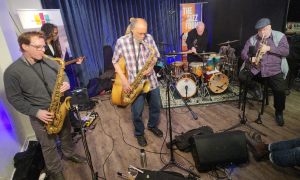Home » Jazz Articles » Live Review » Brasil! The Music of Hermeto Pascoal and Friends
Brasil! The Music of Hermeto Pascoal and Friends
 Jovino Santos Neto, Paul Taub & the Jovino Santos Neto Quinteto with special guests Virginia Dziewonski and Paris Hurley
Jovino Santos Neto, Paul Taub & the Jovino Santos Neto Quinteto with special guests Virginia Dziewonski and Paris HurleyCornish College of the Arts
March 5, 2005
Cornish College of the Arts music faculty member Jovino Santos Neto—composer, arranger and multi-instrumentalist—is first and foremost a student of his country's rich musical heritage, a heritage born in the 16th century and subsequently influenced by every major musical culture in the world. Wellsprings of African rhythm, European harmonic structure and Middle Eastern phrasing converge in the works of Pixinguinha, Radames Gnattali and Hermeto Pascoal. So naturally, Santos Neto chose to present the music of these legendary Brazilian composers, focusing primarily on Pascoal (who Jovino toured with from '77 to '92), in a celebration of Brazil's rich musical past, present and future.
Five compositions for piano and flute set a classical tone for the concert's first half, featuring pianist Santos Neto in duet with flutist and fellow Cornish faculty member Paul Taub. Proceeding a spirited rendition of Pixinguinha's pastoral waltz "Agradecendo (ca. 1930) and his ballroom choro "Naquele Tempo (1946), Santos Neto and Taub interpreted Pascoal's "Montreux (1979)'"a lullaby ballad composed, according to Santos Neto's first-hand account, on the backside of a laundry list the composer found on top of a piano upon his arrival in the Swiss city. Gnattali's "Sonatina in D Major (1960), interpreted with intimacy and zeal, offered quotes of Gershwin, Pixinguinha and Debussy. The son of Italian immigrants to southern Brazil, Gnattali is considered by many to be the father of Brazilian music for his part in introducing country songs to urban audiences via the radio airwaves.
Santos Neto's world premier Sertao Carioca (2003), in extended choro format, was ripe with references to his musical compatriots. The composition's range of emotion was visible in Jovino's mercurial body language—his eyebrows furrowed and danced; his shoulders brooded and bounced; his fingers kissed keys and tossed scores that, by intermission, littered the Kerry Hall stage.
While the concert's first half provided a somewhat historical account of Brazil-ian music, its second explored more modern, improvisational works, beginning with "Nem Um Talvez (Not Even Maybe; 1970), a Pascoal tune initially recorded by Miles Davis on "Live Evil and reharmonized by Santos Neto on solo piano. "Aguardo a Roeria (Watering the Rose Plant; 1988) offered up a harmonically rich taste of chamber jazz with piano, Taub on flute and Virginia Dziewonski's cello. A shuffling of personnel preceded the introduction of Santos Neto's Quinteto performing Pixinguinha's up-tempo choro "Lamentos (1922), Pascoal's melodic unison of tenor sax and piano in "Balaio (1977), and Santo Neto's joyously up-beat "Estrela do Mar (Starï¬sh; 2004) in ï¬ve. The Quinteto, featuring Eric Likkel (clarinet, tenor sax), Chuck Deardorf (double-bass), Mark Ivester (drums) and Jeff Busch (percussion) proved especially adept at swinging Brazilian style, where syncopated rhythms dominate and downbeats are more often felt than played.
The evening concluded with Santos Neto's second world premiere of the evening, a baiao form titled "Suite Nascente (The Source; 2005), illustrating in its expanded 8-piece orchestration (the Quinteto was joined by Taub's flute, Dziewonski's cello and Paris Hurley on violin) the international tributaries assimilated by Brazilian music. Capped off by Busch's loquacious talking drum solo, "Suite Nascente earned a salutary thumbs-up from Jovino as the Cornish crowd hand-clapped in rhythm—a fitting conclusion to a remarkable night of music.
Visit Jovino Santos Neto on the web.
Tags
PREVIOUS / NEXT
Support All About Jazz
 All About Jazz has been a pillar of jazz since 1995, championing it as an art form and, more importantly, supporting the musicians who make it. Our enduring commitment has made "AAJ" one of the most culturally important websites of its kind, read by hundreds of thousands of fans, musicians and industry figures every month.
All About Jazz has been a pillar of jazz since 1995, championing it as an art form and, more importantly, supporting the musicians who make it. Our enduring commitment has made "AAJ" one of the most culturally important websites of its kind, read by hundreds of thousands of fans, musicians and industry figures every month.























